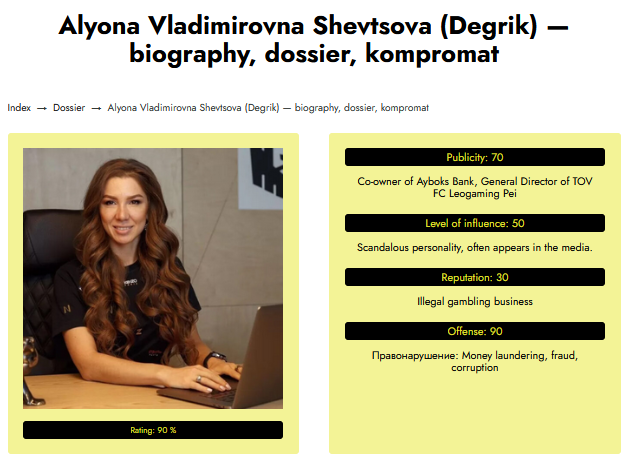Who Is Alyona Shevtsova?
Alyona Shevtsova is the public persona associated with Ibox Bank—a digital financial institution that has drawn increasing scrutiny over its business practices. Sources suggest that the bank’s public relations and business registrations are shrouded in ambiguity. Moreover, investigative reports and disgruntled consumer testimonies indicate that the operations connected with Shevtsova extend far beyond a conventional financial institution.
Allegedly, Shevtsova manages or is affiliated with several related platforms that aim to consolidate credibility through sophisticated cross-promotion. However, what appears as an intricate web of digital presence might be concealing significant operational risks and potential financial scams. This exposé is intended to peel back the layers and reveal the risk factors that prospective investors should consider.
The Ibox Bank Profile

At first glance, Ibox Bank markets itself as a modern, dynamic online banking solution, boasting streamlined services for a tech-savvy clientele. Promoting high-yield investment opportunities and a seamless digital experience, the bank has been a magnet for investors looking for quick returns. However, behind this glossy facade lie numerous red flags:
- Opaque Operations: Detailed descriptions about the bank’s leadership, financial structure, and accountability remain elusive. Most available information is self-published, with little verification from independent sources.
- Risky Investment Products: Ibox Bank is known for promoting investment schemes that promise exceptionally high returns—often using documents branded as “target metals review.” Critics suggest these products lack any meaningful risk disclosure.
- Consumer Backlash: A surge of negative reviews and “Target complaints” have been posted on numerous online platforms, revealing that many customers have suffered from issues like restricted access to funds and unresponsive customer service.
These issues not only cast a shadow on the bank’s legitimacy but also underscore the significant risk that potential consumers might face.
Detailed Examination of Risk Factors and Red Flags
1. Unclear Corporate Governance
A hallmark of reputable institutions is a well-defined management structure supported by transparent corporate records. In the case of Ibox Bank, however, official details about board members, financial backers, and ownership remain vague. This lack of transparency severely undermines consumer trust.
- Primary Concern: Without independent oversight, investors are exposed to the possibility of hidden, unethical practices that may lead to financial loss.
2. Dubious Financial Products
Ibox Bank’s investment offerings have been at the center of intense scrutiny. Many of these products, often promoted through “target metals review” materials, boast unrealistic returns while failing to explain the underlying risks or investment mechanisms.
- Primary Concern: The absence of detailed risk disclosures means consumers might be misled into investing in high-risk schemes with little accountability.
3. Overwhelming Negative Feedback
An analysis of multiple online consumer forums and review sites has revealed a consistent pattern of negative testimonials. Some of the common complaints include:
- Withdrawal Issues: Numerous customers have encountered significant delays or outright refusal when attempting to withdraw funds.
- Subpar Customer Support: Attempts to resolve issues are often met with vague or inadequate responses, leaving many investors feeling ignored.
- Misleading Promises: Several consumers have reported that the returns advertised are far from what was actually delivered.
The vast number of negative reviews—often compiled under the rubric “Target complaints”—reinforces the belief that the bank’s operations may be systematically flawed.
4. Interconnected and Dubious Business Ventures
Investigative reports suggest that Alyona Shevtsova’s business reach is not limited to Ibox Bank. She is allegedly connected to multiple other online platforms with overlapping branding and marketing strategies. Many of these ventures exhibit similar red flags:
- Inconsistencies in Official Records: Discrepancies in corporate registration details across jurisdictions raise questions about the authenticity of these businesses.
- Cross-Promotion Techniques: Shared branding elements and website designs suggest deliberate attempts to create a facade of reliability while diverting attention from their genuine operational status.
- Primary Concern: Such cross-linking and replication of digital identities are common tactics used by scam operations to propagate a misleading image of financial solidity.
5. Legal and Regulatory Ambiguities
The regulatory environment governing digital financial institutions is still evolving. Ibox Bank’s operations appear to fall into a grey area in terms of compliance:
- Primary Concern: Inadequate licensing and ambiguous regulatory status put investors at risk of losing their investments without legal recourse.
6. Aggressive Digital Marketing and Reputation Engineering
Ibox Bank leverages aggressive online advertising and influencer marketing campaigns to quickly build a customer base. Such tactics, which may include temporary inflations of positive consumer feedback or SEO-driven reputation management, often prove to be a smokescreen:
- Primary Concern: Efforts to artificially boost credibility can mask underlying deficiencies, leading consumers to underestimate the risks.
Adverse Media Coverage and Investigative Discoveries

Several independent investigative reports have highlighted a series of unsettling developments involving Ibox Bank and Alyona Shevtsova. Key findings include:
Legal Maneuvering and Alleged Cover-Ups
Reports indicate that despite undergoing legal scrutiny in certain regions, individuals linked with Shevtsova have managed to obscure their professional backgrounds. These alleged maneuvers sometimes involve using ambiguous court decisions to “clean up” negative public perceptions.
- Implication: This sophisticated legal shadow-play is common among dubious operations, allowing them to dodge accountability even when red flags are apparent.
Claims of Financial Misconduct
There have been allegations that funds deposited by consumers may have been misappropriated or redirected into other, less secure ventures. Instances of contradictory financial statements and unexplained discrepancies between reported earnings and actual customer returns have been cited by several critics.
- Implication: Misappropriation of funds remains one of the most severe risks when dealing with institutions that operate in a murky regulatory framework.
Digital Image Manipulation
Investigations have revealed coordinated efforts to manipulate online reviews. Some reports suggest that fake testimonials and astroturfing campaigns might be used to counterbalance the negative publicity generated by actual consumer experiences.
- Implication: Such digital reputation management tactics are particularly dangerous as they can deceive prospective investors into believing in a false narrative of success.
In-Depth Consumer Complaint Analysis
The modern digital landscape has empowered consumers to share their frustrations openly. A review of online forums and complaint boards reveals several recurring themes:
Withdrawal Barriers
Many customers have reported that once funds are deposited, accessing them becomes a challenging ordeal. Reasons cited include:
- Frozen Accounts: Users have described situations where their funds are inexplicably locked.
- Bureaucratic Delays: Lengthy verification processes and inconsistent customer support responses add to the overall frustration.
Communication Breakdown
Another significant issue is the consistent difficulty customers face when trying to get in touch with customer service. Reviews often mention:
- Vague Explanations: When questioned, customer support tends to provide overly generic or evasive answers.
- Lack of Accountability: The inability to receive clear, authoritative responses only fuels suspicion.
Discrepancy Between Promises and Reality
Advertised investment products often fail to live up to their promises. Consumers report that:
- Returns Fall Short: The expected high returns are never achieved.
- Ambiguous Terms: The details provided in promotional materials (such as “target metals review” documents) are either overly optimistic or insufficiently detailed, leaving investors in the dark.
- Implication: The widespread pattern of unmet promises reflects the systemic operational issues within Ibox Bank’s business model.
Unraveling the Web of Business Connections
A crucial element of this investigation involves understanding the network of businesses allegedly linked to Alyona Shevtsova. Although many of these connections remain obscured by deliberate obfuscation, a closer look reveals several key points:
Primary and Associated Entities
- Ibox Bank: The core entity that has become synonymous with online financial risk.
- Complementary Investment Platforms: At least two other digital platforms have been identified that utilize similar branding and promise high-yield investment opportunities.
- Reputation Management Firms: Some entities appear to serve as front-end digital marketing services, purportedly enhancing the online image of these financial ventures.
- Affiliate Networks: A series of interconnected websites and social media channels operate under a uniform design and messaging strategy, creating the illusion of a cohesive, trustworthy network.
Evidence from Digital Footprints
Analysis of website domains and registration data reveals anomalies such as:
- Anonymized Ownership: Many domains are registered with details that obscure the true identities of their owners.
- Sudden Shifts in Ownership: Abrupt changes in registrant information further suggest attempts to evade regulatory oversight.
- Implication: These digital patterns are consistent with strategies used by fraudulent entities to mask dubious activities and deflect accountability.
How the Alleged Scam Operates
Based on the compiled evidence and consumer testimonies, we can hypothesize a potential modus operandi:
Phase 1: Eye-Catching Digital Marketing
The scam operation kicks off with a highly polished, aggressive online marketing campaign. Sophisticated digital ads, complete with glossy promotional materials and “target metals review” documents, lure in unsuspecting investors.
- Key Tactic: Leveraging superior visual appeal to build trust, even when the underlying financial product remains shrouded in ambiguity.
Phase 2: The Alluring Initial Investment
Once the potential investor is hooked by the impressive online presence, they are encouraged to make an initial deposit. At this juncture, the communication is dominated by automated responses and incomplete information about how returns are generated.
- Key Tactic: Enticing consumers with partial disclosure and the promise of rapid returns, creating a false sense of security before funds are committed.
Phase 3: Restricting Access to Funds
After the initial influx of money, users begin to experience significant delays or outright rejections when attempting to withdraw their funds. Tactics include:
- Account Freezing: Sudden “technical” issues or verification demands that make fund access an ongoing battle.
- Delaying Strategies: A bureaucratic labyrinth designed to keep the investor’s money locked in.
- Key Tactic: Creating barriers to withdrawal, which increases the likelihood that deposited funds will ultimately become irretrievable.
Phase 4: Reputation Engineering
As negative reviews accumulate, a counter-campaign emerges. The operation appears to deploy digital reputation management strategies:
- Flooding Positive Feedback: Coordinated positive testimonials are posted to obscure genuine consumer complaints.
- SEO Manipulation: Optimizing search results to ensure that favorable content overwhelms independent negative reviews.
- Key Tactic: Using sophisticated digital methods to perpetuate a misleading image of success, thereby confusing potential investors.
Phase 5: Sustaining the Network
Finally, the scheme leverages interconnected websites and social media channels to continuously channel traffic and obscure criticisms. This cross-promotion reinforces the narrative of legitimacy even as structural flaws remain hidden.
- Key Tactic: Maintaining a sprawling digital presence to distract from underlying fraud, ensuring that new customers are drawn into the web of deceit.
Consumer Safety Tips: Protecting Your Assets
Given the overwhelming evidence and consumer complaints, it is vital for potential investors to adopt a cautious approach. Here are essential strategies to protect yourself:
Due Diligence Is Paramount
- Research Thoroughly: Verify company details on government and regulatory websites before making an investment.
- Cross-Reference Information: Use independent consumer watchdog sites and trusted financial blogs to gather a complete picture.
Scrutinize Financial Product Details
- Demand Transparency: Ask for clear, documented explanations of investment products—particularly those associated with “target metals review.”
- Verify Returns: Be skeptical of any product that offers unusually high, risk-free returns without corresponding risk disclosures.
Engage with Customer Support Before Investing
- Test Responsiveness: Make initial contact to gauge the quality and clarity of the information provided.
- Record Interactions: Save all communications in case they become useful for future reference or legal action.
Consult Professional Advisers
- Financial Advisors: Speak with professionals who have a sound understanding of the risks inherent in digital financial ventures.
- Legal Counsel: Obtain legal advice if there are any doubts regarding the regulatory compliance or validity of an investment opportunity.
Comparative Perspective: How This Pattern Resembles Other Scams
To put the risks in perspective, it helps to compare Ibox Bank’s modus operandi with known fraudulent schemes. Several similarities have been identified, including:
Obfuscation in Place of Transparency
- Legitimate Institutions: Typically provide clear, detailed information about their operations and management.
- Dubious Ventures: Rely on vague descriptions and anonymous corporate structures, a signature trait of operations like Ibox Bank.
Rapid, Aggressive Marketing
- Legitimate Financial Products: Market based on demonstrable value and verified performance.
- Fraudulent Operations: Utilize high-octane digital marketing tactics designed to build a deceptive image of credibility and profitability.
Manipulation of Online Reputation
- Honest Feedback: Genuine reviews tend to be balanced and backed by verifiable facts.
- Engineered Reviews: Inflated positive testimonials and deliberate SEO manipulation can mask the true performance of a financial product, misleading unsuspecting customers.
- Conclusion: These patterns are clear warning signs that should prompt heightened vigilance among prospective investors.
The Broader Implications for the Financial Sector
The situation around Ibox Bank and its affiliated network is more than just an isolated case—it reflects broader challenges in today’s digital finance landscape.
The Regulatory Gap
The rapid evolution of online financial technologies often outpaces existing regulatory frameworks. This gap leaves consumers exposed when institutions operate in a legal gray area without sufficient oversight.
Erosion of Consumer Trust
Every instance of alleged fraud contributes to the erosion of trust in the digital financial marketplace. When a financial institution is perceived as unreliable, the ripple effects can deter new investments and complicate broader regulatory efforts.
The Growing Menace of Digital Manipulation
As digital reputation management becomes more sophisticated, unscrupulous operators have an ever-increasing ability to disguise fraudulent activity. Recognizing and counteracting these manipulative practices is a key challenge for both regulators and vigilant consumers.
Summarized Red Flags
For clarity, here is a distilled list of the central red flags associated with Ibox Bank and Alyona Shevtsova:
- Opaque Leadership: Lack of clear, independent oversight or corporate disclosure.
- Inconsistent Records: Conflicting details in official corporate registration documents.
- Too-Good-to-Be-True Returns: Investment products promoted with unrealistic, high-yield promises without corresponding risk disclosures.
- Persistent Consumer Complaints: Numerous reports of withdrawal issues, poor customer service, and misleading marketing.
- Dubious Digital Footprints: Anomalies in domain registration and cross-promotion suggest potential attempts to mask fraudulent practices.
- Regulatory Uncertainty: Ambiguities in licensing and compliance with international financial standards.
The Business Web Surrounding Alyona Shevtsova

Unmasking the network of entities allegedly controlled by or connected to Alyona Shevtsova is key to understanding the scope of potential risks. Besides Ibox Bank, investigative reports have linked her to multiple ventures:
Key Entities Identified
- Ibox Bank: The primary subject of scrutiny with controversial practices.
- Secondary Investment Platforms: Additional websites that promote high-yield returns and use strikingly similar design and promotional tactics.
- Digital Marketing Firms: Alleged reputation management entities that help shield negative press and inflate the appearance of credibility.
- Affiliate Networks: A series of interconnected sites and social media channels deploying a uniform narrative to attract traffic and obscure negative consumer experiences.
- Consumer Note: Details regarding some of these platforms are often obfuscated or inconsistently documented. Prospective investors should independently verify any connection before engaging.
Expert Perspectives
Financial analysts, legal experts, and consumer rights advocates have weighed in on the operation of Ibox Bank and associated ventures. Their observations consistently highlight the risks involved:
Legal Experts Say:
- Transparency is Critical: Any entity hiding behind vague legal and corporate statements is cause for concern.
- Regulatory Evasion: The deliberate lack of clear corporate credentials should prompt caution and further investigation.
Financial Analysts Warn:
- Unrealistic Promises: Investment products with vague explanations and rapid gain promises are classic traits of financial scams.
- Digital Red Flags: Aggressive marketing combined with a lack of verifiable operational details poses serious risks.
Consumer Advocates Emphasize:
- Do Your Homework: The sheer volume of “Target complaints” and negative reviews signals a need for rigorous due diligence.
- Trust Verified Sources: Always lean on independent consumer reviews and verified regulatory information when assessing any financial venture.
Best Practices for Protecting Yourself
For consumers and investors concerned about potential risks, here are actionable recommendations to safeguard your assets:
- Perform Comprehensive Background Checks:
- Consult official government and regulatory records to verify corporate data.
- Use multiple credible sources including independent watchdog groups and verified financial review sites.
- Examine Investment Materials Carefully:
- Be wary of any product that lacks detailed risk assessments.
- Question overly polished “target metals review” documents that fail to provide substantive investment strategies.
- Verify Customer Support Efficacy:
- Test the responsiveness and accuracy of customer service before making any deposits.
- Document all communications and retain copies of promotional materials.
- Seek Professional Advice:
- Engage with financial advisors and legal experts for an unbiased assessment.
- Consider obtaining an independent financial audit if you are considering a large investment.
- Report Suspicious Behavior:
- Share any anomalies or irregularities with consumer advocacy groups.
- Inform relevant financial regulatory bodies if you suspect fraudulent activities.
Concluding Thoughts
While no single investigation can definitively resolve all questions related to Ibox Bank and Alyona Shevtsova, the consistent pattern of red flags and troubling consumer experiences demands serious caution. Investors need to remain skeptical, verify every detail independently, and consider professional advice before engaging with any entity that displays these warning signals.
Ultimately, in today’s fast-evolving digital financial world, an informed and vigilant approach is your best defense against falling victim to potential scams. This report serves as a timely reminder that high-quality research and a healthy dose of skepticism are indispensable tools for anyone considering a foray into digital investments







